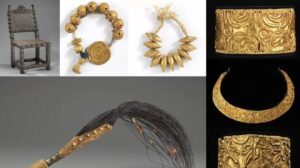In a historic move, a U.S. museum has returned a significant collection of royal regalia to Ghana, marking a milestone in the repatriation of looted artefacts. The Fowler Museum at the University of California, Los Angeles (UCLA), announced the return of the items, which were looted by British colonial soldiers 150 years ago from the Asante kingdom.
The returned artefacts, consisting of royal objects, were acquired by an American collector and later donated to the museum. Following the donor’s passing, representatives of the Fowler Museum officially handed over the items to the Asante king, Otumfuo Osei Tutu II, in a ceremony held in the city of Kumasi.

However, challenges persist as some museums cite legal restrictions preventing the permanent return of contested items in their collections. Despite this, the Fowler Museum emphasized that the return was voluntary and permanent, aligning with a shift towards museums recognizing their ethical responsibility to the communities of origin.
 Also, read; Madagascar Passes Law for Surgical Castration of Paedophiles
Also, read; Madagascar Passes Law for Surgical Castration of Paedophiles
Among the returned items are an elephant tail whisk, royal stool ornaments, a royal necklace, strands of beads, and an ornamental chair. Notably, four of these artefacts were looted during the 1874 sacking of Kumasi, while three were part of an indemnity payment made by the Asante kingdom to the British.
Ivor Agyemang Duah, director of the Asante royal museum, highlighted the significance of these objects, describing them as connecting the present to the past and embodying the essence of a civilization.
However, as Ghana celebrates this repatriation, there are calls for a deeper examination of the origins of these artefacts. Historian Kwaku Darko Ankrah of the University of Ghana emphasized the importance of understanding how the Asante kingdom acquired such items and urged for a process to identify original owners.
 Ankrah emphasized the equitable rights of those original owners, suggesting that if they cannot be identified, the artefacts should be considered national treasures of Ghana.
Ankrah emphasized the equitable rights of those original owners, suggesting that if they cannot be identified, the artefacts should be considered national treasures of Ghana.
As Ghana welcomes back these treasures from its past, the return sparks a broader conversation about restitution, ownership, and the shared cultural heritage of nations around the world.
